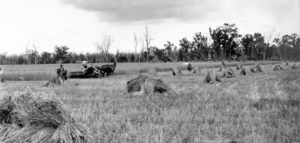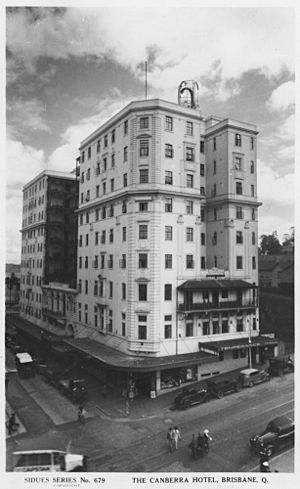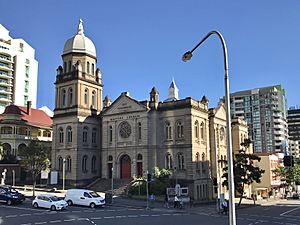Caroline Archer facts for kids
Quick facts for kids
Caroline Archer
|
|
|---|---|
| Born | 22 February 1922 Cherbourg Aboriginal reserve, Queensland, Australia
|
| Died | 8 December 1979 (aged 57) |
| Occupation | Activist, telephonist |
| Spouse(s) | Frederick Archer |
| Parents |
|
| Awards | Queen Elizabeth II Silver Jubilee Medal |
Caroline Lillian Archer (born 22 February 1922 – died 8 December 1978) was an Aboriginal Australian activist and telephonist. She worked hard to improve life for Indigenous Australians.
Caroline was born in the Aboriginal reserve in Cherbourg, Queensland. Her father was white and her mother was Aboriginal. As a child, Caroline faced tough times. She grew up under the control of the Queensland Department of Native Affairs. She suffered from not having enough food, which caused her to have a permanent limp and health problems.
When she was 14, Caroline started working as a house helper. Her employer was very supportive. She was given a special permission that allowed her more freedom than most Aboriginal Australians at the time. This was very rare.
Later, Caroline became the first Aboriginal person in Brisbane to work as a public servant operating a main switchboard. She also opened a gift shop called Jedda in Surfers Paradise, Queensland. She sold Indigenous art and crafts there.
Caroline was also a strong activist. She worked to protect Australian Aboriginal culture from being unfairly used by others. She joined a group called the One People of Australia League (OPAL). She became a leader in this group. In 1978, she joined the Department of Aboriginal Affairs. Here, she taught schoolchildren in Canberra about Indigenous culture.
Contents
Caroline's Early Life
Caroline Archer was born in the Aboriginal reserve in Cherbourg, Queensland. Her mother was Lillian Masso (later Fogarty) and her father was Norman Brown. Caroline's mother faced difficulties and was moved with her family to Cherbourg. This happened because she didn't want her family to be separated.
As a child, Caroline didn't get enough food. This affected her health and left her with a limp. She grew up under the control of the Queensland Department of Native Affairs. This department separated Aboriginal people onto special reserves. The department was in charge of Aboriginal people who were seen as "State Wards."
Caroline went to school on the reserve. She finished fourth grade, which was seen as enough education for an Aboriginal girl back then. The school followed a special plan for Aboriginal schools. It focused on practical skills. Before the 1967 referendum, many Australians knew that Aboriginal people often had very poor education.
When she was 14, Caroline worked for the Kay family near Inglewood, Queensland. She was paid the same as a white worker, not less like other Aboriginal servants. They also encouraged her to keep learning.
Caroline's Career
After working for the Kay family, Caroline moved to Brisbane. She worked in a private home. From 1935 to 1949, she worked at the Canberra Hotel. There, she learned how to use a telephone switchboard. In 1950, she became a switchboard operator for the Postmaster-General's Department (PMG).
Caroline was the first Aboriginal person in Brisbane to operate a main switchboard as a public servant. She worked hard to gain full citizen's rights. This meant she got special permission to be free from the laws that controlled Aboriginal people. This approval was given based on how she behaved and her way of life.
Caroline was very interested in teaching others about Aboriginal culture. She wanted both white Australians and younger Aboriginal people to appreciate it. She opened a gift shop in Surfers Paradise, Queensland, called Jedda. It was named after the main character in the 1955 film Jedda. In her shop, she sold Indigenous art, crafts, and items. She got these directly from Indigenous artists.
Caroline opened the shop to encourage people to practice traditional crafts. It also helped young Aboriginal people learn business skills. She believed it was important to protect Aboriginal art and designs. This would stop others from copying them unfairly for money.
Caroline's Activism
Caroline Archer was very involved in helping her community. She helped bring back the Miss OPAL Quest. This was a beauty pageant that helped Aboriginal models. She also taught them how to present themselves well.
Caroline was a "middle of the road" activist. This means she preferred calm solutions to problems. She didn't like extreme ideas. She saw herself as an Australian first, and then an Aborigine.
Caroline worked to protect Australian Aboriginal culture from being used unfairly. She joined the One People of Australia League (OPAL). This group was started to bring together "Coloured and White Citizens of Australia." OPAL was not political. It was set up in Brisbane in 1961. It helped Aboriginal children and offered support to Aboriginal people. OPAL wanted to improve living and education standards for Indigenous Australians. Both European and Indigenous Australians ran the group.
As the state president of OPAL, Caroline traveled to national meetings. She also talked to politicians to make changes. In 1974, she became the first Aboriginal executive-officer of OPAL. Later, she became the State president for the group.
Caroline cared deeply about improving relations between different races. She worked for the Queensland Department of Education. Later, in 1978, she worked for the Department of Aboriginal Affairs. She was an Education Consultant on Aboriginal culture. She worked in Canberra, visiting schools and other groups. She talked about different parts of Aboriginal culture. She would ask children to think about how people who could survive in the bush must have had special knowledge.
Recognition
In August 1977, Caroline Archer received the Queen Elizabeth II Silver Jubilee Medal. This award was given to her for her important contributions to the community.
Caroline's Personal Life
On 29 December 1951, Caroline married Frederick Archer. They were married at the Baptist City Tabernacle. Frederick was from England and worked with aircraft. He was also a photographer. They had two daughters and one son.
Caroline died on 8 December 1978 in Coonabarabran, New South Wales. She was in a car accident. She was traveling home to Brisbane for Christmas from Narrabri. Her husband, son, and two daughters were also in the car. They survived the accident. Caroline was cremated.
See also
- Joyce Wilding (1909–1978), an activist for Indigenous rights in Queensland.
- Caroline Tennant-Kelly (1899–1989), an activist and anthropologist who worked in Cherbourg.
- Jackie Huggins (born 1956), an author and Aboriginal rights activist.
 | James Van Der Zee |
 | Alma Thomas |
 | Ellis Wilson |
 | Margaret Taylor-Burroughs |




